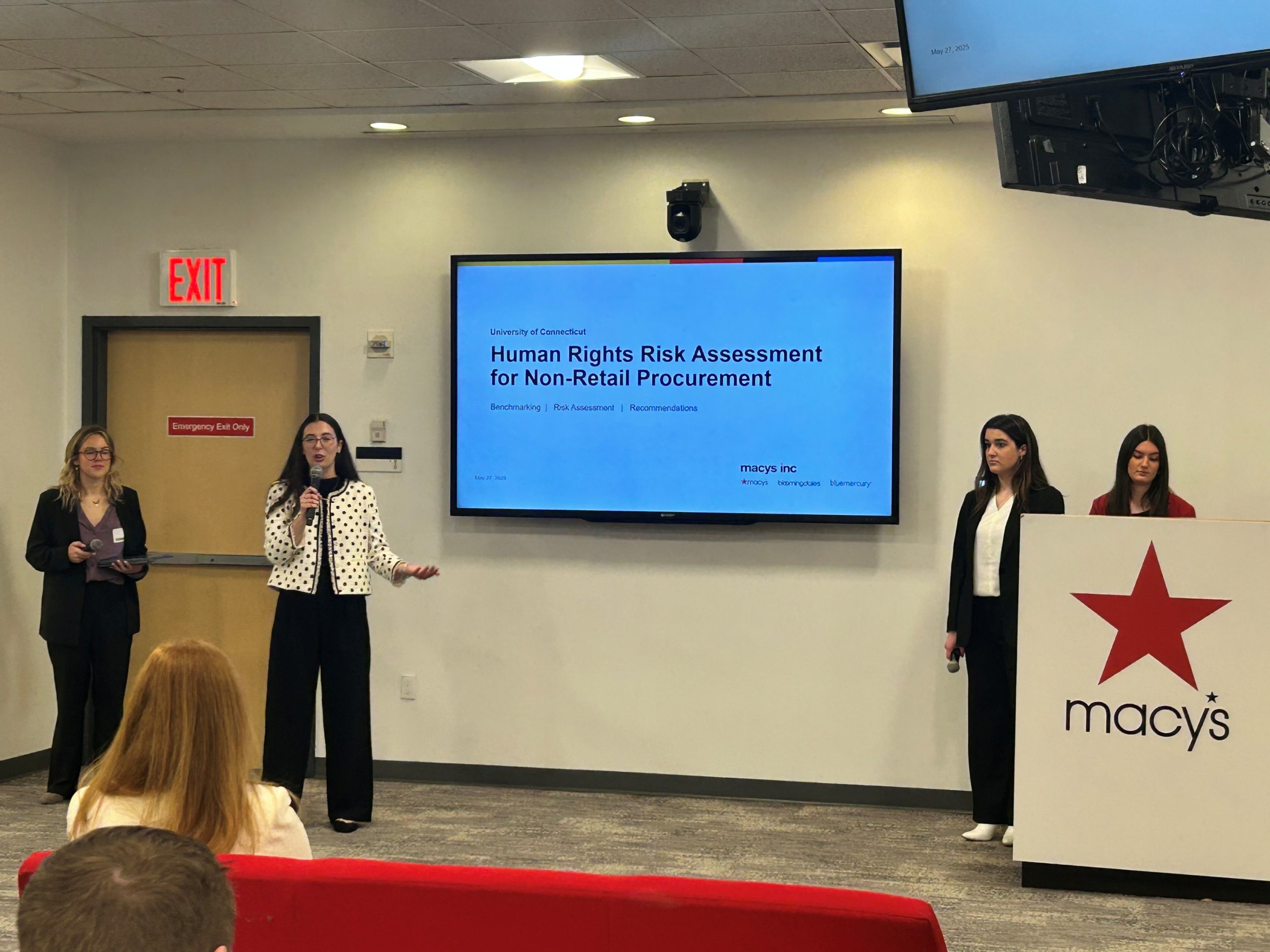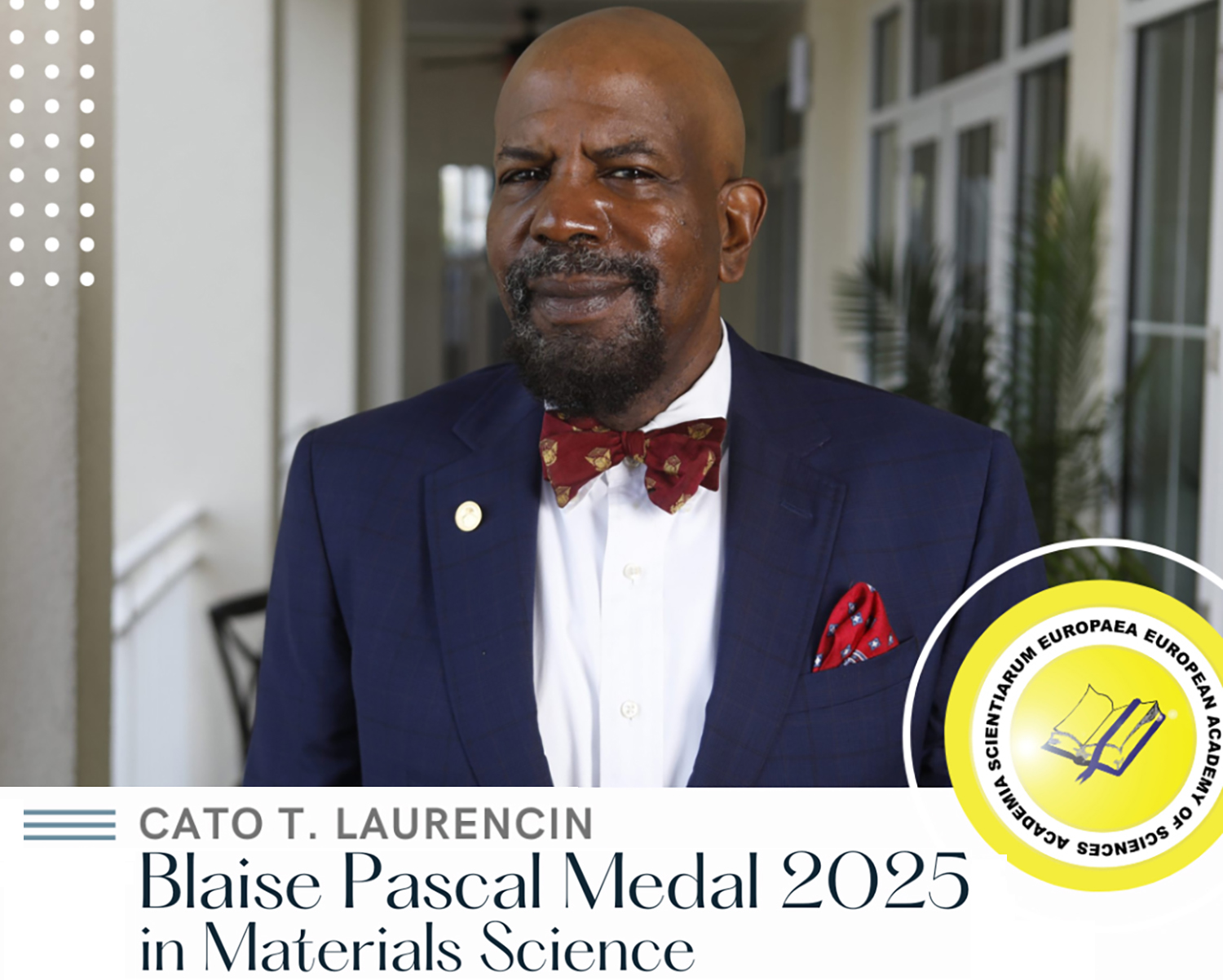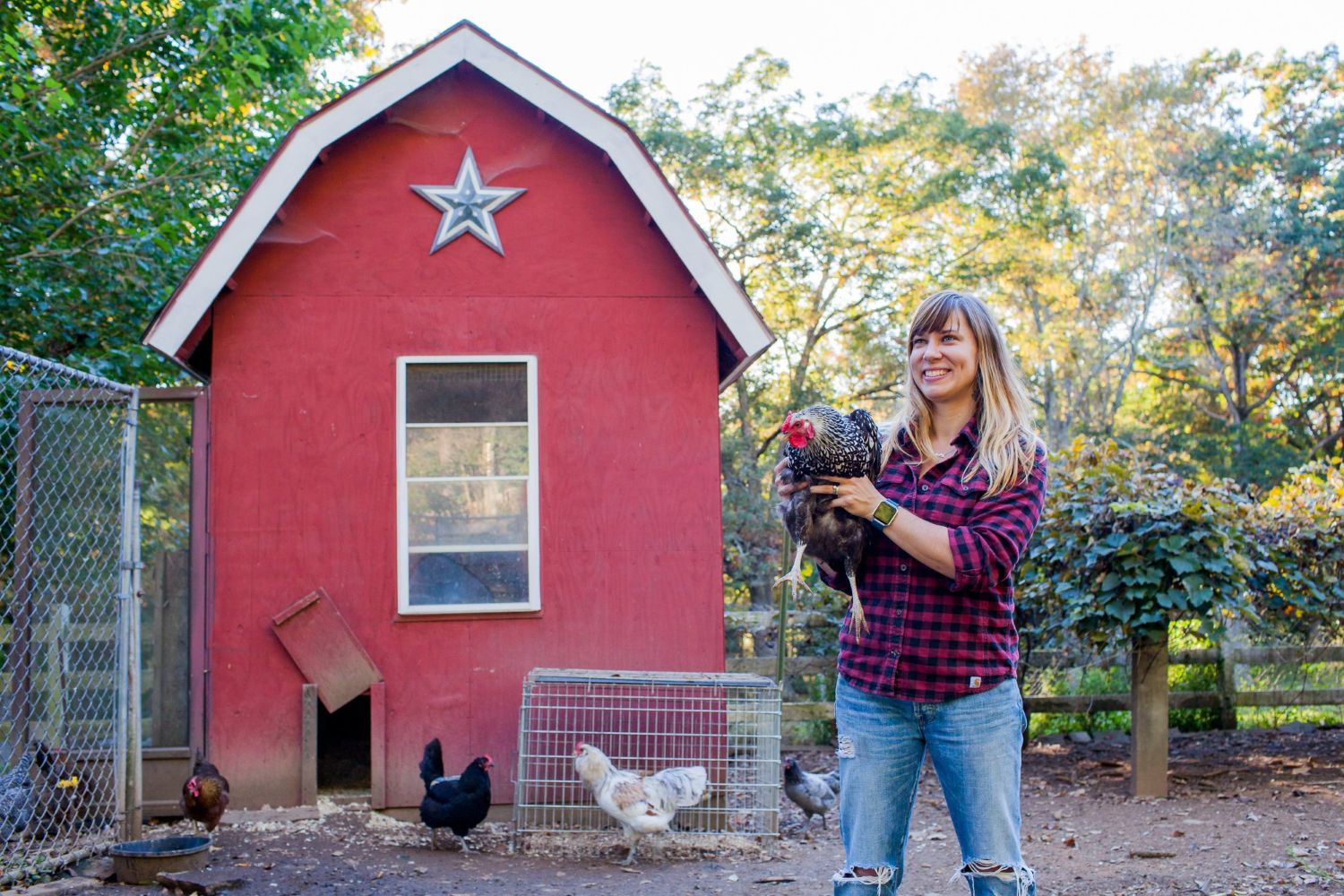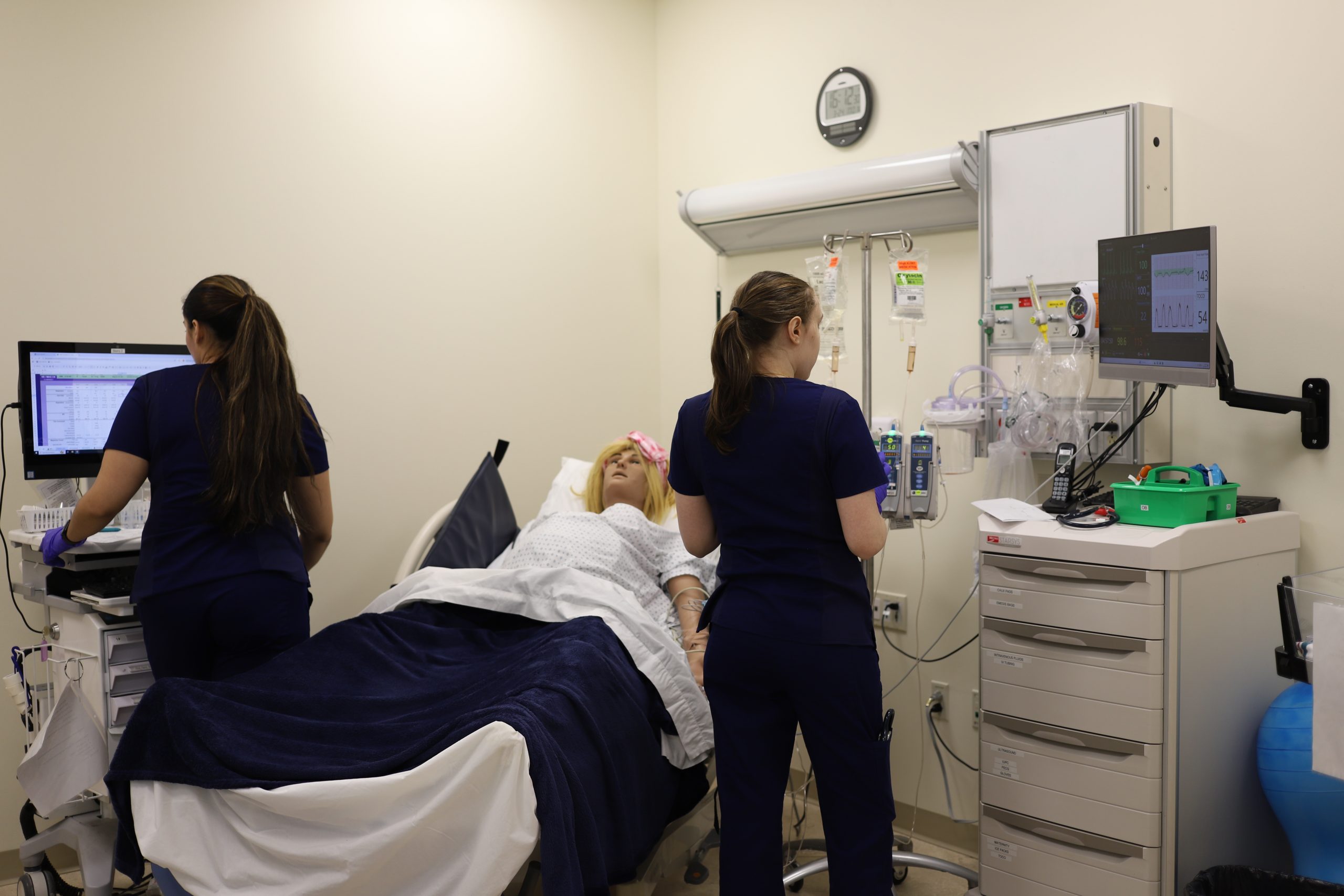Macy’s Welcomes Four UConn Business Grad Students to Explore Sustainable Practices
Macy’s Inc. recently invited four UConn business graduate students to serve as consultants in a months-long project reviewing and analyzing the company’s sustainable business practices.
Each of the four students were enrolled in the “Social Responsibility and Accountability in Business” course taught by business law professor Rachel Chambers. The course is part of a newer graduate program on Social Responsibility & Impact in Business.
The students took on the four-month project as an extracurricular challenge.
“It was definitely very daunting at first because we realized we were covering such a large area of the business, things consumers rarely think about like, ‘Where did they get their hangers?,’ and ‘Who created their signs?,’ or ‘Who is cleaning the building?,’’’ says Caroline Keary ’25 (BUS), ’26 MS.
She and School of Business classmates Liz Sullivan ‘25, Arianna Landesbaum, ’24, ’25 MS, and Taylor Moran ’25 worked with Macy’s from February to May. The students partnered with two retail leadership teams to examine Macy’s policies around non-retail procurement, including things like packaging, cleaning materials, third-party vendors, and transportation.
Leaders from Macy’s procurement and sustainability departments played key roles in guiding and mentoring throughout the project. Students were offered ownership over how they approached the project, which involved risk assessment, benchmarking, and exploring industry best practices.
“In a class project, you know generally what you’re going to produce. But each week of this project, things changed a little,” Keary says. “It gave me a realistic view of how social sustainability meshes with the practical realities of implementing decisions at a large company.’’
UConn Students Provide ‘Incredibly Insightful’ Work
“Through Macy’s social commitment, Mission Every One, we aim to empower the next generation of leaders. Our partnership with UConn demonstrates that commitment in action by providing future leaders with real-world experience and solution collaboration opportunities,” says Laurie Rando, Senior Director of Sustainability at Macy’s.
“We enjoyed working with this group of high-caliber students,” she says. “The work they did is incredibly insightful and will help us as we continue enhancements in human rights due diligence work.’’
Keary and Sullivan are staying on as Macy’s summer interns to begin implementing some of the ideas that the UConn team recommended.
Macy’s Treated Students Like Professionals
Chambers, who is also the Co-Director of the Business and Human Rights Initiative at UConn, heard about the Macy’s project and submitted a 30-page proposal outlining what students could accomplish. The retailer offered a $65,000 grant to enable students to be paid for their research and to cover their travel expenses for two trips to Macy’s Herald Square flagship in Manhattan.
“Our students were treated like professional consultants. They played active roles as partners, creating and presenting findings,” Chambers says. “Their meetings required formal agendas, their projects had time constraints, and their work involved professional engagement with many members of the Macy’s team.’’

“The students did so well. I remember the last phone call when they were peppered with questions, and they offered great responses,” she says. “That was the moment when I saw how far they’d come.’’
The experience will certainly serve the students well, Chambers says.
“Having direct experience with an iconic brand like Macy’s will be a gamechanger for our students as they take next steps in their professional journeys,’’ Chambers says. “This is one of the experiences that makes the UConn program and experience distinctive.’’
Making Human Rights ‘Actionable’
Landesbaum says in addition to applying her sustainability knowledge, the project allowed her to sharpen her business skills.
“My favorite part of the project was the overall experience. I discovered how to take an issue, see challenges, and propose a solution in a meaningful and actionable way,’’ she says.
“This experience allowed me to see how a company operates, how to interact with people who have more experience, how to network, and how best to manage time. I learned strategies that I’ll take with me wherever I work. It was a really great experience and I’m grateful for the opportunity,’’ she says.
‘You Don’t Have to be a Lawyer’
Brie Seferian ’02 (SFA), a senior manager in Sustainability at Macy’s, helped spearhead the student project. Seferian says it is one thing to be versed in academic theory, but that doesn’t necessarily prepare young workers to address real world challenges.
“This was a good opportunity to apply their new skills to real-world issues,’’ she says. “The student team put their knowledge to use in a more structured way, developed a deep level of critical thinking, and conducted a project across multiple departments.’’
On the last day, the students received career coaching and the opportunity to meet an array of Macy’s colleagues. “We wanted them to see all the careers they could pursue with their expertise and to know you don’t have to be a lawyer to have an impact on social responsibility,’’ Seferian says.
Students Optimistic About the Future
Sullivan says that her work at Macy’s validated her interest in sustainability, and she was excited to see that such an important company is committed to sustainable business practices.
“It gives me hope about where we go in the future. This is an important concern for all businesses,’’ she says. “This was my first internship, and I was able to present in front of some very key executives. The School of Business prepares you for public speaking, my courses gave me the knowledge that I needed, and my friends and I practiced our presentation so many times. I loved seeing it come together and creating something clear and concise from something so broad.’’
Arminda Kamphausen, director of Global and Sustainability Initiatives at the School of Business, says the partnership was powerful.
“For one of the biggest and arguably the most prestigious department stores in the world, to open their doors to our students and allow them to take a peek at their work and say, ‘How can we improve our human rights policies?’ is incredible,’’ she says.
“As our students look back, I think they will remember the challenges but also that this was one of the greatest learning experiences and a chance to build strong relationships,’’ she says. “In the end what was good for Macy’s, and for our students, ultimately served both planet and people.’’
Latest UConn Today
- Sir Cato T. Laurencin of UConn to Receive the 2025 Blaise Pascal Medal in Materials ScienceProfessor Sir Cato T. Laurencin, MD, PhD, has been named the winner of the 2025 Blaise Pascal Medal in Materials Science from the European Academy of Sciences (EURASC) for his exceptional contributions to the field.
- Grown ConNECTed: Cultivating Community and Food Access Across Eastern Connecticut“Find a farm you love and support them. There are so many to choose from, and they’re all part of our community”
- UConn School of Nursing Leads the Way in Simulation Technology and Teaching PracticesEnhancing clinical competency and building confidence in nursing students with the use of emerging simulation technology.
- ‘Turning Back Time’: UConn Researchers Developing Treatment to Reverse Brain Damage from StrokeUConn neuroscientist and chemist receive NIH R01 grant to support their collaboration
- UConn Receives State GreenerGov Awards for On-Campus Sustainability EffortsThe projects being honored further the goal of achieving climate neutrality by 2030
- HBJ “40 Under Forty” Honors Four From School of BusinessThe award recognizes outstanding young professionals in Greater Hartford who have demonstrated leadership, entrepreneurial spirit, and community involvement. The award ceremony will be Sept. 11 at the Aqua Turf Club in Plantsville.













